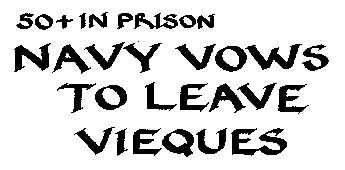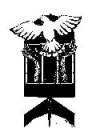


|

|
The "creative tension" wrought by successful campaigns of civil disobedience is nowhere more evident today than in Puerto Rico. On June 14, the eve of the second round of bombing of Vieques in less than two months, and with some 85 resisters in federal prison, President Bush announced that the permanent cessation of bombing would come in 2003.
Testifying before the House Armed Services Committee two weeks later, as the bombing wound down, Navy Secretary Gordon England said that continued use of the Vieques bombing range had become "untenable," and the Bush administration did not want the Congressionally-mandated referendum set for November to go forward. Given the choice offered by the referendum - keeping the status quo or Navy out by 2003 - he told the panel that the result was a "foregone conclusion," and one the Navy should set the precedent of making, rather than its neighbors. England acknowledged the announcement was timed with some hope it would help abate further protest. But it did not.
In word and deed, Puerto Ricans from across the political spectrum rejected a two-year delay before the Navy quits. The island government scheduled its own nonbinding referendum July 28 for Vieques' 9,400 residents, which includes the choice of halting the bombing immediately. At least 70 more people were arrested on the bombing range between June 19-29, and half of that number are still in jail at press time, refusing bail.
The tension reached a critical point in late April, when the Navy resumed practice with inert bombs after a federal court said Puerto Rico's government had failed to show irreparable harm would come if the bombing resumed. Arriving by land and by sea, the presence of people on the range forced the Navy to delay bombing and even suspend it for one day. The Navy claimed that the surprise halt was only "respecting the sensitivities of our neighbors in Vieques" on the occasion of the beatification of a Puerto Rican cleric.
Leading Puerto Rican politicians, U.S. Representative Luis Gonzalez, and other public figures were among those arrested during the bombing. The sister of David Sanes, the Navy security guard whose death from an errant bomb in April, 1999 triggered the current protests, was among those arrested.
The stories about harsh treatment of many while in custody were under-reported until the shocking details were repeated during Congressional hearings in early June. Stories like that of Velda González, 68-year old grandmother and vice president of the Puerto Rican Senate who was taken outside the processing center where "they made the most indecent, disgusting, immoral search of me, out in the street, in front of a cyclone fence with 20 Navy men watching."
The federal court was setting bail for some at $3,000-$10,000, but
defendants who defiantly refused to recognize the court's jurisdiction were
denied bail altogether. Sentences of 20, 30, 45 and even 120 days in
prison were common in many cases brought to trial in the following days and
weeks.

By Saturday afternoon, April 28, at least 87 people had been arrested. Hundreds gathered at Justice and Peace Camp, at the gate to the bombing range, were subjected to repeated bursts of tear gas and pepper spray. Large sections of the fence that separates the eastern third of the island, where the bombing takes place, from the civilian areas, had been cut down. The Navy complained that Puerto Rican police on duty from the main island did nothing to stop the resistance, while the Puerto Rican police chief criticized the use of pepper spray on detainees. One observer characterized the scene as "civil insurrection."
Ismael Guadalupe of Vieques, who served six months in federal prison for a 1979 bombing protest, was again arrested for the crime of "stepping on the land where I was born."
By the time the bombing ended May 2, more than 180 arrests were reported, bringing the total number of arrests since the civil disobedience campaign began two years earlier to over 1,100. The reaction of the federal courts escalated, and during trials in late April and May, dozens received sentences reanging from 20 days to four months in prison. Demonstrations outside the federal prison in Guaynabo on the main island grew larger as the number of imprisoned resisters increased. Tens of thousands demonstrated at the prison on May 28.
Supporters in New York called on the United Nations to demand the body investigate human rights violations on Vieques. Twenty-eight people were arrested there on May 15, and another 15 on May 31. Their first court hearing was sent for June 28.
On May 23, three New York politicians, State Assemblyman José Rivera, City Councilman and Borough President Candidate Adolfo Carrion, and Bronx County Democratic Chair Roberto RamĚrez received two-month jail sentences. Their co-defendant, civil rights activist Rev. Al Sharpton, was sentenced to three months in prison. Of the international publicity that ensued, Robert Rabin, a spokesman for the Committee for the Rescue and Development of Vieques (CRDV) said, "We could not have devised or paid for a better public relations campaign for our struggle than what the Navy has given us by jailing these important leaders of the civil rights movement".
Roberto Ramirez wryly observed from prison that where he came from, "not going to jail was an incredible achievement. I spent all my life staying away from jail". The New Yorkers were sent to serve their sentence closer to home, where only Rev. Al Sharpton remains behind bars. The other three were released June 29.
Also in May, Alberto "Tito Kayak" De Jes's and Gazir Sued were convicted in separate New York trials on charges from last fall's action atop the Statue of Liberty. De Jes's was released pending sentencing July 30, and returned to Puerto Rico for a probation violation hearing. In Puerto Rico, he was found in violation and sentenced to one year in prison.
With dozens of resisters jailed, preparations for the next round of
bombing intensified. A June 11 statement from the Justice and Peace Camp
declared in part:
"Just like in April, when our forces held up the naval exercises at several
moments, during the upcoming maneuvers we will also resist this military
force that enslaves us in the name of 'freedom', violates our human rights
while 'defending' democracy. There is no turning back for us. The mayor,
the parish priest, our women, youth and fishermen, in short: our people,
have decided that the US Navy will not fire any more bombs without the
community resisting through pacifist civil disobedience. Neither threats
from two hundred Puerto Rican police members, nor tear gas, nor
rubber-bullet shotguns can tame these people who have taken control of
their future to ensure a free and healthy Vieques for the next
generations."
Groups of prepared resisters began entering the bombing range on June 18, where some were arrested soon after breaching the fence and others headed for the backcountry. Flares were launched and banners hung from within the bombing range, delaying again some of the planned war games.
As the latest war games and bombing came to an end, seven people,
including Connecticut state legislator Evelyn Mantilla, were arrested June
27 at the Armed Forces Recruiting Center in Hartford. More than 100
supporters demonstrated nearby, chanting support for an end to the bombing
of Vieques as the group was arrested.

For more information, contact the Committee for the Rescue and Development of Vieques, POB 1424, Vieques, PR 00765; (787)741-0716; bieke@coqui.net
Letters of support should be sent to the Vieques resisters at their addresses listed in Inside & Out.
